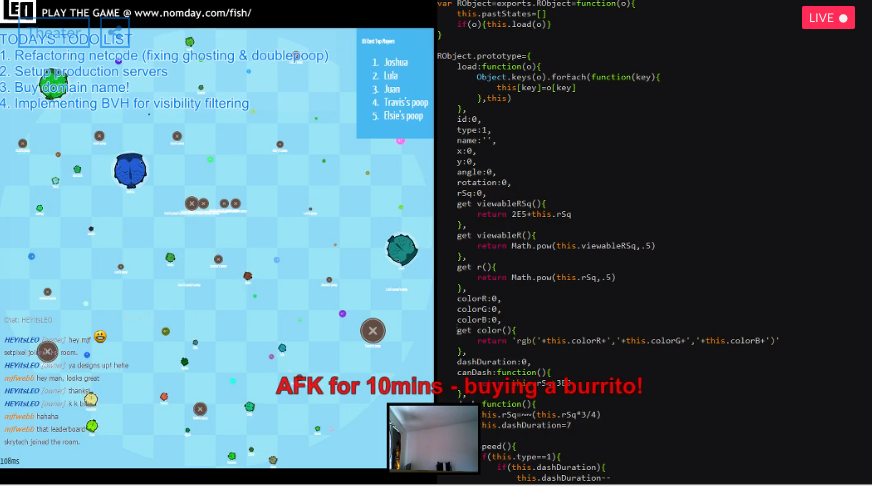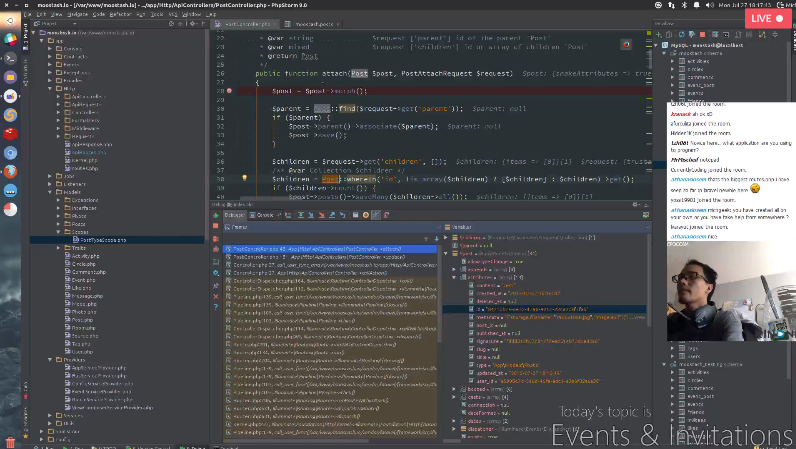Who Wants to Watch Me Code?
by Caleb Garling

IndieDeveloper is trying to change the color of the ground to something that’s more red. He’s not succeeding; it is still very green. “I don’t fucking understand,” he says. “That didn’t do shit. Oh my god I’m getting so fucking mad right now. It is seriously pissing me off.” He’s tabbing and moving through code so fast that my screen becomes a manic strobe of code and pixels.
IndieDeveloper is building a game called Dungeon Looter, a Legend of Zelda-like overhead quest, where your character walks around collecting stuff while dodging bad guys and doing adventure-y things. A few minutes later, IndieDeveloper is still on the hunt for the rogue color controller. “It feels darker but it’s really not,” he says. “Is it darker?” He moves closer to the screen. “No it’s not! It’s not fucking changing!” Fifteen people are watching, but no one is offering assistance in the chat bar. The only other noise on the video stream is IndieDeveloper’s techno music, which is calm and soothing, the tones sharp and exact; you can almost detect the value of each note on a grid.
Finally, IndieDeveloper makes a change, and the ground and walls in the game tint crimson. He starts singing along to the music, mimicking the beeps and boops. But now there’s a small time gap between his keystrokes and when the dungeon looter actually changes direction. “It’s laggy as shit,” he says. “Why is it so laggy?”
This is Livecoding.tv. The easy, startup-to-startup analog is that it’s like Twitch, the live video-game-streaming platform recently acquired by Amazon for a billion dollars, but for coding. The service, founded in August of last year by Jamie Green and Michael Garbade, broadcasts hundreds of simultaneous livestreams a day, allowing anyone to peer over the shoulder of developers performing all things code, from creating silly games to re-organizing complicated databases. (It is basically against the rules to have a startup that occupies a small, dedicated niche without a plan to at least attempt to scale it a billion users in order to generate the kind of exponential returns that investors today seek, so Green, accordingly, says that the site will eventually be “Twitch, but for education.”) The core of why Livecoding works as a concept, though, is that much of building software is situational, conditional, and experiential — an elaborate problem-solving exercise where there are sometimes hard, right or wrong answers, but more often, there are good solutions and others that are merely less so — so there’s always a reason to watch.
For non-coders, Livecoding is a peek at (alleged) modern literacy. Coding is creating and vetting logic, an unending puzzle that can induce insanity and euphoria, often concurrently. It’s layers and layers of cluttered windows, file directories and under-construction renderings of a product. It’s troubleshooting, swearing, slamming soda, pounding beer, alt-tabbing, blog skimming, StackExchange and random forum hunting — someone must have had this same question, right? It’s seeking help because coding is better as a team sport, until it isn’t because everyone else is fucking up your shit. And on Livecoding it’s a lot of sitting and watching a guy — it’s almost always a dude — assembling a cryptic tapestry of words, punctuation and numbers that underpin software, just like what you’re using right now.
But like any social network, coders are incentivized to develop their own aura, their own environment. How do you stand out? What information do you offer? What experience do you provide? When I catch Pyro666, he’s coding shirtless with inspirational orchestral tunes; Jennifer answers questions about JavaScript with infectious enthusiasm (verbally, not over chat); and mess_84 of the Ukraine blasts American blues while building a page in HAML. Teachers or performers, they expose their talents for public consumption, creating another tile of one’s Internet #brand.

A coder from Porto Alegre, Brazil, named chocsx, has his camera fixed downward, at a backlit keyboard, so that you can’t see his face, only a grey hoodie. He’s been coding for five years, and PHP is his favorite language. According to his profile, this is his favorite line of code: me = new Person(); while(me.awake()){ me.code(); }. His total viewer tally is at more than thirteen hundred (and counting), which is better than par, but by no means a chart-topper. Electronic music provides the soundtrack — airy synth that makes you think of sunrises or moments of redemption in cheesy movies. He checks his phone, then tabs through lines of PHP, Javascript, and CSS, then tabs to someone’s blog, which seems to explain how to write code for a certain rendering or styling of a webpage. He searches for “Motivation music,” and chooses the first result, called “Epic motivational music mix.” It is the 1,528,172nd play. The first song is called “Stand and Fight.” It’s inspirational, symphonic, and chocsx’s hands move a little faster. He consults another blog. He copies and pastes some code. He checks Caniuse.com, a site that documents what browsers support what front-end technologies. The music gets too motivational, too heavy, and I turn it off.
There are still kinks in the service. Developers tend to work on big monitors; if your viewing window isn’t as big as theirs (like my laptop), the text will be small, blurry, and largely useless unless the livestreamer takes the time to stop, highlight and explain. But the last thing many coders want to do is break focus, a state so many try so hard to achieve. The sidebar offers chat, though many developers prefer answering questions via Skype, so that their cursor never leaves the code. The cameras that provide the experience sit at different points in every developer’s room. Some position the camera straight on, so you feel like you’re Facetiming; some have a camera perched at an angle, up, to the side, so you feel like you just happen to be walking past their desk; and others eschew a camera all together.
Buttonsz, a British developer, enjoys the collaborative coding. He livestreams regularly at 9 PM GMT, Monday through Friday, and at 8 PM on Sundays. He and four other coders want to build a game based on a piece of literature. They estimate that this will be a ten-day project, but they are easily distracted: Buttonsz drinks a Beck’s as they discuss whether “crisps” and “potato chips” are the same thing; a baby cries in the background of someone’s Skype channel. Then they try to get a coder into a HipChat room and ask his name in real life. “I don’t know if he has a real name,” someone says.
At last, they focus. Buttonsz encourages viewers to suggest features. They agree that they need a storyline people know, so that the game’s concept is easy to communicate. One coder, xmetrix wants to make a game out of Atlas Shrugged. The problem — one of many — is that Atlas Shrugged isn’t in the public domain, and Rand died in 1982. “Somebody should have killed her off sooner,” someone says. “Mean,” Buttonsz laughs. They settle on The Picture of Dorian Grey.
But they’ve taken too long: Nearly six thousand people have viewed the channel, but, the livestreamers notice, only thirteen are watching right now.
